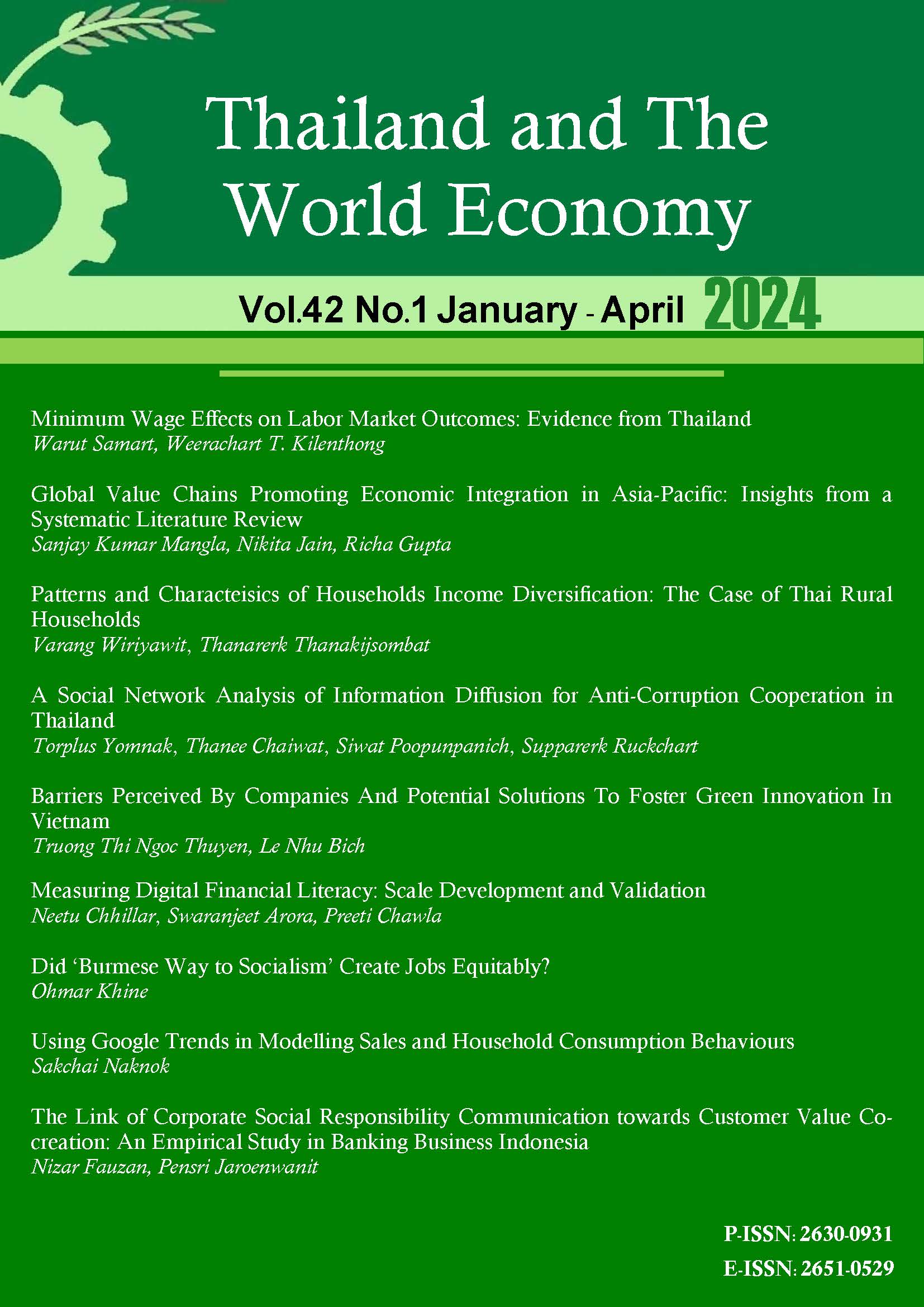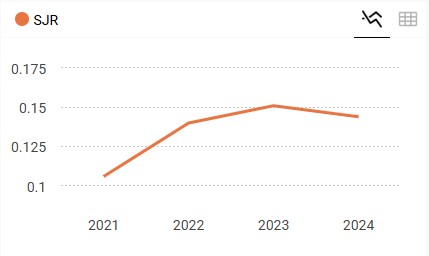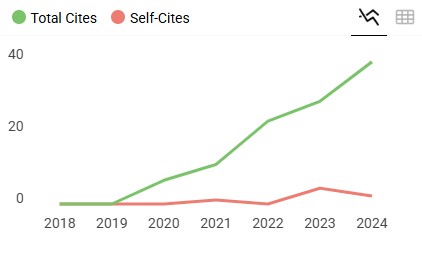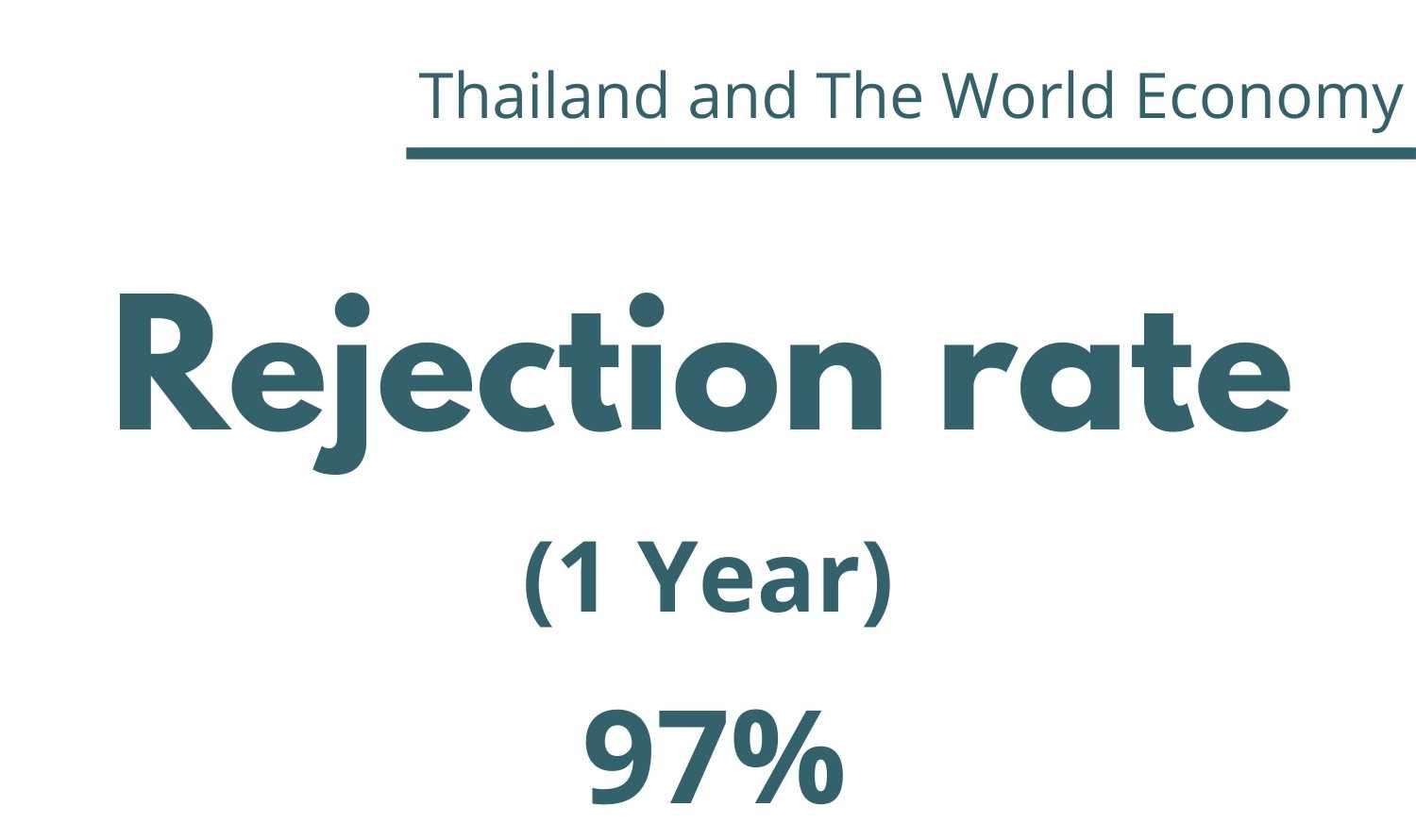The Link of Corporate Social Responsibility Communication towards Customer Value Co-creation: An Empirical Study in Banking Business Indonesia
Keywords:
Social Media Influencers, Customer Company Identification, CSR Communication, Customer Value Co-creationAbstract
Corporate social responsibility (CSR) is integral to its strategy to promote long-term success and improve the community's well-being. It involves identifying and implementing strategies and procedures designed to promote ethical practices. The concept of CSR is crucial to a banking business's overall strategy to enhance its relationship with its customers. This study aims to analyze the impact of CSR on the interactions between social media influencers, customer value co-creation, and the banking industry in Indonesia. The study was conducted through quantitative research. The primary data was based on stratified sampling obtained through the 400 samples from Indonesia who have purchased and recognized CSR of the banking business. This study used a standardized questionnaire to evaluate our model generated from the works of literature. The statistics have applied confirmatory factor analysis and structural equation model AMOS 28. CSR communication and each construct considerably affect banking business performance in exploring sustainability programs. Results revealed that social media influencers have a positive impact on CSR communication. Correspondingly, CSR communication has a positive impact on customer company identification. CSR communication has a positive impact on customer value co-creation. The paper comes up with the literature by confirming that consumers in Indonesia intend to sponsor the banking business CSR activities. Then, the increasing number of investigations related to CSR could help improve the banking industry's competitive advantage and financial performance.
References
Abaidoo, R., Agyapong, E. K., & Boateng, K. F. (2021). Stability in the banking industry and commodity price volatility: Perspective from developing economies. Journal of Economic and Administrative Sciences, 39(4), 988-1012.
Afonso Vieira, V., Wolter, J. S., Falcão Araujo, C., & Saraiva Frio, R. (2022). What makes the corporate social responsibility impact on customer–company identification stronger? A meta-analysis. International Journal of Research in Marketing, 40(2), 475-492.
Ahen, F., & Zettinig, P. (2015). Critical perspectives on strategic CSR: What is sustainable value co-creation orientation?. Critical Perspectives on International Business, 11(1), 92–109.
Ahmad, N., Scholz, M., Ullah, Z., Arshad, M. Z., Sabir, R. I., & Khan, W. A. (2021). The nexus of CSR and co-creation: A roadmap towards consumer loyalty. Sustainability (Switzerland), 13(2), 1–15.
Ajzen, I., & Fishbein, M. (1975). A Bayesian analysis of attribution processes. Psychological Bulletin, 82(2), 261–277.
Amaladoss, M. X., & Manohar, H. L. (2013). Communicating corporate social responsibility – A case of CSR communication in emerging economies. Corporate Social Responsibility and Environmental Management, 20(2), 65–80.
Anderson, J. C., & Gerbing, D. W. (1988). Structural equation modeling in practice: A review and recommended two-step approach. Psychological Bulletin, 103(3), 411–423.
Bhattacharya, C. B., Korschun, D., & Sen, S. (2017). Strengthening stakeholder- company relationships through mutually beneficial corporate social responsibility initiatives. Journal of Business Ethics, 85(2), 257–272.
Bialkova, S., & Te Paske, S. (2021). Campaign participation, spreading electronic word of mouth, purchase: How to optimise corporate social responsibility, CSR, effectiveness via social media?. European Journal of Management and Business Economics, 30(1), 108–126.
Biggemann, S., Williams, M., & Kro, G. (2014). Building in sustainability, social responsibility and value co-creation. Journal of Business and Industrial Marketing, 29(4), 304–312.
Boccia, F., Malgeri Manzo, R., & Covino, D. (2019). Consumer behavior and corporate social responsibility: An evaluation by a choice experiment. Corporate Social Responsibility and Environmental Management, 26(1), 97–105.
Castro, S., Lacap, J. P., Garbosa, T. M., Jimenez, E., & Mallari, S. F. (2022). Philippine television network companies’ corporate social responsibility engagements and electronic word-of-mouth: The intervening role of consumer-company identification. Journal of Asia-Pacific Business, 23(1), 24–45.
Chang, W., & Taylor, S. A. (2016). The effectiveness of customer participation in new product development: A meta-analysis. Journal of Marketing, 80(1), 47–64.
Cheng, G., Cherian, J., Sial, M. S., Mentel, G., Wan, P., Álvarez-Otero, S., & Saleem, U. (2021). The relationship between CSR communication on social media, purchase intention, and e-WOM in the banking sector of an emerging economy. Journal of Theoretical and Applied Electronic Commerce Research, 16(4), 1025–1041.
Cheng, Y., Chen, Y. R. R., & Hung-Baesecke, C. J. F. (2021). Social media influencers in CSR endorsement: The effect of consumer mimicry on CSR behaviors and consumer relationships. Social Science Computer Review, 39(4), 744–761.
Cheng, Y., Hung-Baesecke, C.-J. F., & Chen, Y.-R. R. (2021). Social media influencer effects on CSR communication: The role of influencer leadership in opinion and taste. International Journal of Business Communication, 23294884211035110.
Cordeiro, J. J., Galeazzo, A., Shaw, T. S., Veliyath, R., & Nandakumar, M. K. (2018). Ownership influences on corporate social responsibility in the Indian context. Asia Pacific Journal of Management, 35(4), 1107–1136.
Dai, W., & Reich, A. Z. (2022). The differential impact of monological and dialogical corporate social responsibility communication strategies on brand trust in the credence goods market. Asia Pacific Journal of Marketing and Logistics, 35(1), 231-248.
Dalla-Pria, L., & Rodríguez-de-Dios, I. (2022). CSR communication on social media: The impact of source and framing on message credibility, corporate reputation and WOM. Corporate Communications, 27(3), 543–557.
Demming, C. L., Jahn, S., & Boztug, Y. (2017). Conducting mediation analysis in marketing research. Marketing: ZFP–Journal of Research and Management, 39(3), 76-93.
Fatma, M., Khan, I., Kumar, V., & Shrivastava, A. K. (2022). Corporate social responsibility and customer-citizenship behaviors: The role of customer–company identification. European Business Review, 34(6), 858–875.
Fatma, M., Khan, I., & Rahman, Z. (2018). CSR and consumer behavioral responses: The role of customer-company identification. Asia Pacific Journal of Marketing and Logistics, 30(2), 460–477.
Fatmawati, I., & Fauzan, N. (2021). Building customer trust through corporate social responsibility: The effects of corporate reputation and word of mouth. Journal of Asian Finance, Economics and Business, 8(3), 0793–0805.
Georgiadou, E. (2022). Communicating customer-CSR expectations on corporate websites: An analysis of the banking industry in the United Arab Emirates. Corporate Communications, 27(4), 654–673.
Gupta, S., Nawaz, N., Tripathi, A., Muneer, S., & Ahmad, N. (2021). Using social media as a medium for CSR communication, to induce consumer-brand relationship in the banking sector of a developing economy. Sustainability (Switzerland), 13(7), 1-16
Hair, J. F., Black, W. C., Babin, B. J., & Anderson, R. E. (2010). Multivariate data analysis (7th ed.). Harlow: Pearson.
Iglesias, O., Markovic, S., Bagherzadeh, M., & Singh, J. J. (2020). Co-creation: A key link between corporate social responsibility, customer trust, and customer loyalty. Journal of Business Ethics, 163(1), 151–166.
Islam, T., Islam, R., Pitafi, A. H., Xiaobei, L., Rehmani, M., Irfan, M., & Mubarak, M. S. (2021). The impact of corporate social responsibility on customer loyalty: The mediating role of corporate reputation, customer satisfaction, and trust. Sustainable Production and Consumption, 25(1), 123–135.
Kaplan, R., & Kinderman, D. (2017). The business-led globalization of CSR: Channels of diffusion from the United States into Venezuela and Britain, 1962-1981. Business & Society, 59(3), 439–488.
Kassemeier, R., Haumann, T., & Güntürkün, P. (2021). Whether, when, and why functional company characteristics engender customer satisfaction and customer-company identification: The role of self-definitional needs. International Journal of Research in Marketing, 39(3), 699-723.
Kuah, A. T. H., Xia, Y., & Wang, P. (2022). How do corporate social responsibility engagements drive consumer–company identification in Singapore? Sustainability (Switzerland), 14(10), 1-23.
Kumar, K., & Prakash, A. (2020). Managing sustainability in banking: Extent of sustainable banking adaptations of banking sector in India. Environment, Development and Sustainability, 22(6), 5199–5217.
Leclercq-Machado, L., Alvarez-Risco, A., Esquerre-Botton, S., Almanza-Cruz, C., de las Mercedes Anderson-Seminario, M., Del-Aguila-Arcentales, S., & Yáñez, J. A. (2022). Effect of corporate social responsibility on consumer satisfaction and consumer loyalty of private banking companies in Peru. Sustainability (Switzerland), 14(15), 1-17.
Lichtenstein, D. R., Drumwright, M. E., & Braig, B. M. (2004). The effect of corporate social responsibility on customer donations to corporate-supported nonprofits. Journal of Marketing, 68(4), 16–32.
Lou, C. (2022). Social media influencers and followers: theorization of a trans-parasocial relation and explication of its implications for influencer advertising. Journal of Advertising, 51(1), 4–21.
Martínez-López, F. J., Aguilar-Illescas, R., Molinillo, S., Anaya-Sánchez, R., Andres Coca-Stefaniak, J., & Esteban-Millat, I. (2021). The role of online brand community engagement on the consumer-brand relationship. Sustainability (Switzerland), 13(7), 1–17.
Mi, C., Chang, F. K., Lin, C. T., & Chang, Y. H. (2018). The theory of reasoned action to CSR behavioral intentions: The role of CSR expected benefit, CSR expected effort and stakeholders. Sustainability (Switzerland), 10(12), 1-17.
Mishra, P., Pandey, C. M., Singh, U., Gupta, A., Sahu, C., & Keshri, A. (2019). Descriptive statistics and normality tests for statistical data. Annals of Cardiac Anaesthesia, 22(1), 67–72.
Mohd Paiz, N. A., Hareeza Ali, M., Rashid Abdullah, A., & Dato Mansor, Z. (2020). The effects of service quality on satisfaction and purchase intention in mobile commerce. International Journal of Business and Management, 15(4), 36-42.
Morsing, M., & Schultz, M. (2006). Corporate social responsibility communication: Stakeholder information, response and involvement strategies. Business Ethics: A European Review, 15(4), 323–338.
Mubushar, M., Jaafar, N. B., & Rahim, R. A. (2020). The influence of corporate social responsibility activities on customer value co-creation: The mediating role of relationship marketing orientation. Spanish Journal of Marketing - ESIC, 24(3), 309–330.
Nguyen, N. T. T., Nguyen, N. P., & Thanh Hoai, T. (2021). Ethical leadership, corporate social responsibility, firm reputation, and firm performance: A serial mediation model. Heliyon, 7(4), 1-9.
Pongsakornrungsilp, S., & Schroeder, J. E. (2011). Understanding value co-creation in a co-consuming brand community. Marketing Theory, 11(3), 303–324.
Puriwat, W., & Tripopsakul, S. (2021). Customer engagement with digital social responsibility in social media: a case study of COVID-19 situation in Thailand. Journal of Asian Finance, Economics and Business, 8(2), 475–483.
Raza, A., Rather, R. A., Iqbal, M. K., & Bhutta, U. S. (2020). An assessment of corporate social responsibility on customer company identification and loyalty in banking industry: A PLS-SEM analysis. Management Research Review, 43(11), 1337–1370.
Raza, A., Saeed, A., Iqbal, M. K., Saeed, U., Sadiq, I., & Faraz, N. A. (2020). Linking corporate social responsibility to customer loyalty through co-creation and customer company identification: Exploring sequential mediation mechanism. Sustainability (Switzerland), 12(6), 1-19.
Rindfleisch, A., & O’Hern, M. (2010). Customer co‐creation: a typology and research agenda. Review of Marketing Research, 6(1), 86–106.
Schallehn, H., Seuring, S., Strähle, J., & Freise, M. (2019). Defining the antecedents of experience co-creation as applied to alternative consumption models. Journal of Service Management, 30(20), 209–251.
Schouten, A. P., Janssen, L., & Verspaget, M. (2021). Celebrity vs. Influencer endorsements in advertising: the role of identification, credibility, and Product-Endorser fit. In Leveraged Marketing Communications (pp. 208-231). Routledge.
Seele, P., & Lock, I. (2015). Instrumental and/or deliberative? a typology of CSR communication tools. Journal of Business Ethics, 131(2), 401–414.
Shayan, N. F., Mohabbati-Kalejahi, N., Alavi, S., & Zahed, M. A. (2022). Sustainable development goals (SDGS) as a framework for corporate social responsibility (CSR). Sustainability (Switzerland), 14(3), 1-27.
Simpson, B., Robertson, J. L., & White, K. (2020). How co-creation increases employee corporate social responsibility and organizational engagement: the moderating role of self-construal. Journal of Business Ethics, 166(2), 331–350.
Sun, H., Rabbani, M. R., Ahmad, N., Sial, M. S., Guping, C., Zia-Ud-din, M., & Fu, Q. (2020). Csr, co-creation and green consumer loyalty: Are green banking initiatives important? A moderated mediation approach from an emerging economy. Sustainability (Switzerland), 12(24), 1–22.
Tandelilin, E., & Usman, B. (2023). Toward a better understanding of social impact, CSR reporting and firm performance: a look at the ASEAN banking industry. Social Responsibility Journal, 19(3), 579-600.
Tang, L., Gallagher, C. C., & Bie, B. (2014). Corporate Social Responsibility Communication Through Corporate Websites: A Comparison of Leading corporations in the United States and China. International Journal of Business Communication, 52(2), 205–227.
Utkarsh & Gupta, R. K. (2022). Effects of confidence and social benefits on consumers’ extra-role and in-role behaviors: A social identity and social exchange perspective. Journal of Retailing and Consumer Services, 65(2), 1-12.
van de Vijver, F. J. R., & Leung, K. (2021). Methods and data analysis for cross-cultural research. Methods and Data Analysis for Cross-Cultural Research. (Vol. 116). Cambridge University Press.
von Wallpach, S., Voyer, B., Kastanakis, M., & Mühlbacher, H. (2017). Co-creating stakeholder and brand identities: Introduction to the special section. Journal of Business Research, 70(1), 395–398.
Wu, Q., Cherian, J., Samad, S., Comite, U., Hu, H., Gunnlaugsson, S. B., Sial, M. S. (2021). The role of CSR and ethical leadership to shape employees’ pro-environmental behavior in the era of industry 4.0. A case of the banking sector. Sustainability (Switzerland), 13(17), 1-20.
Youn, S. yi, & Cho, E. (2021). CSR ads matter to luxury fashion brands: A construal level approach to understand Gen Z consumers’ eWOM on social media. Journal of Fashion Marketing and Management, 26(3), 516-533.
Zhang, Q., & Ahmad, S. (2022). Linking corporate social responsibility, consumer identification and purchasing intention. Sustainability, 14(19), 1-17.
Downloads
Published
How to Cite
Issue
Section
Categories
License
Copyright (c) 2024 Thailand and The World Economy

This work is licensed under a Creative Commons Attribution-NonCommercial-NoDerivatives 4.0 International License.










